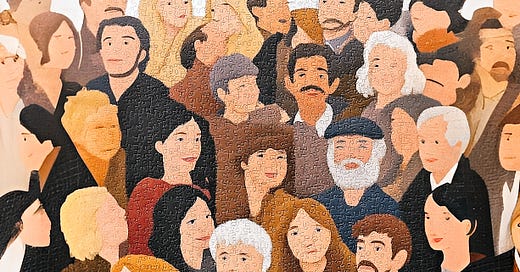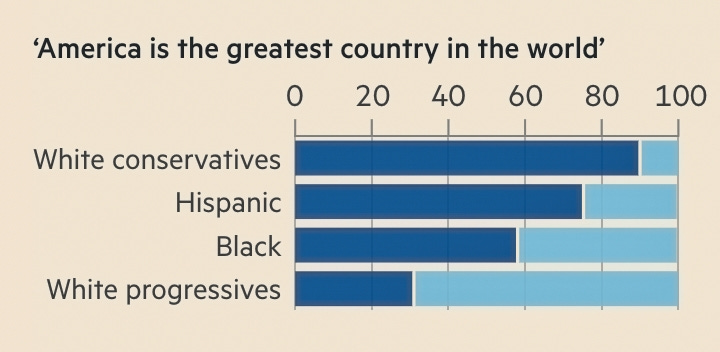Words are a slippery human creation, so let’s define three for the purposes of this Substack post:
Self: The sense of ourselves as continuing, discrete entities. Even though we understand this as an illusion, we depend on it to get by in this relative world.
Ego: The cognitive drive to reinforce and cling to the concept of self.
Group: Any sorting or delineation of more than one self.
With that in mind, here’s a quotation from George Carlin:
People are wonderful. I love individuals. I hate groups of people. I hate a group of people with a “common purpose” 'cause pretty soon they have little hats. And armbands. And fight songs. And a list of people they're going to visit at 3 a.m. So, I dislike and despise groups of people, but I love individuals. Every person you look at, you can see the universe in their eyes, if you're really looking.
Carlin had a penchant for hyperbole, but I get his drift. When people join together for a cause, they often get carried away. I’ve worn little hats and armbands, sung fight songs, and voiced chants I now regret.
But there’s another type of group Carlin is not referring to here. That’s a group formed because of common characteristics, preferences, or habits. Often, that type of group is defined by others and also recognized by members of the group:
Tall people.
Short people.
Fat people.
Thin people.
“Normal” people.
“White” people.
“Black” people.
People of color.
Hispanic people.
Native people.
Christian people.
Muslim people.
Hindu people.
Buddhist people.
Italian people.
Irish people.
Japanese people.
Republicans
Democrats.
Independents.
Progressives.
Teachers.
Lawyers.
Sanitation workers.
Physicians.
Drinkers.
And on and on and on.
In the relative world we live in, where there’s a self over here and another self over there, we can be classified into groups. We understand that it’s illusory, but we go along with it. I know that I’m part of an interconnected whole, but I live in a world where I’m a short person, a fat person, a “white” person, an ethnically Jewish person, a Buddhist, an independent, a retiree, a blogger, a husband, a father, and so on.
My Buddhist practice calls on me to let my ego define my “self” but not cling to it or any of the groups that self is part of (including the Buddhist group). The sense of self isn’t a problem, and the sense of belonging to a group isn’t a problem, as long as we don’t let our egos cling to either of those concepts.
With that background, what follows is my opinion about current events in the United States. Feel free to disagree in the comments below.
Although some extremist religious figures exalt their followers and condemn non-believers, most see a shared humanity. Here’s Genesis 1:27 (English Standard Version):
So God created man in his own image, in the image of God he created him; male and female he created them.
Both Islam and Judaism regard every human as an equal descendant of Adam. Hinduism teaches that the divine is equally present in all. In Buddhism, every living being (not just humans) has an innate Buddha Nature. Every man and woman has an equal opportunity to become fully enlightened.
We’ve all seen the numbers, however, about religious institutions in the U.S. Membership in churches, synagogues, and mosques dropped from around 70% of the U.S. public in 2000 to less than 50% in 2020. At the same time, we’ve become more socially isolated and polarized.
As spiritual institutions are declining in influence, other “tribes” are taking their place, and it’s much easier to use fear and anger to build a tribe than to use love and compassion. I remember being in the highlands of Papua New Guinea in 1989 and asking someone about the piles of rocks next to the marketplace of many villages. They were ammunition in case a neighboring village came in attack. The American two-party system has become like two of those villages. The existing parties use fear of and anger at the other, which worked this time for the GOP. It had the most rocks to throw.
The GOP’s rocks largely came from a rebellion in the U.S. against what’s seen as an elite class that seems to have engineered a culture of overruling common sense. Common sense says it's unfair in many sports for men to compete against women. Common sense says 12 to 18-year-old children should be very carefully evaluated before undergoing medical treatments that would affect the rest of their lives. Common sense says that every American of European heritage is not responsible to every person of African or Native heritage for what was done to people of those heritages centuries ago.
People are rebelling against a progressive culture that would turn some of the groups I listed above into tribes with piles of rocks. Many of us are letting our egos cling to groups like male, female, “black,” “white,” gay, straight, trans, boomer, Gen X, Millennial, Gen Z, Gen Alpha. What’s most remarkable is that the tribe called progressives is deciding what other groups (those it considers oppressed) want and need.
In her The New York Times opinion article Democrats and the Case of Mistaken Identity Politics, Maureen Dowd cites the gaps between white progressives in the United States and the minorities they claim to champion:
A revealing chart that ran in The Financial Times showed that white progressives hold views far to the left of the minorities they champion. White progressives think at higher rates than Hispanic and Black Americans that “racism is built into our society.” Many more Black and Hispanic Americans surveyed, compared with white progressives, responded that “America is the greatest country in the world.”
Here’s the graph from The Financial Times that I found most interesting:
That’s at least part of the reason why a larger proportion of minority voters cast their ballot for Donald Trump than in the past. Perhaps they, like “white” working-class workers, simply disagree that racism is baked into the U.S. DNA and that it’s not a great country. Perhaps their common sense tells them not to label all "white” people as supremacists.
The act of generalizing about any group violates my deeply held spiritual beliefs. The Buddha treated every individual—untouchable, brahman, leper, criminal, king—the same way, recognizing that person’s innate potential for enlightenment as equal to every other person’s. I feel compelled to speak out when I see grasping at group distinctions and labels.
I voted for Kamala Harris because I fear that Trump will make the tribal antagonism worse and because Harris was careful not to run on her group status. But I’ll close by sharing what I saw in a Substack note from a woman whose race I don’t know. She’s a teacher who has always supported Democrats and vehemently opposed Trump until a month or two ago when one of her students said she’d never honor a white man. The teacher took that as an indication of how much the nation needs to correct its course.
As George Carlin said:
Every person you look at, you can see the universe in their eyes, if you're really looking.
Hours after I posted this, The Chocolate Taoist posted what I think makes a perfect companion for it. One quote:
To reshape these wounds, we must embody the spiritual practice of tikkun olam—repairing the world. This begins with repairing ourselves, recognizing that healing is contagious.
From the Pure Land has hundreds of subscribers in 32 U.S. states and 14 countries. The podcast has listeners in 35 countries. Consider:
If you are not already a subscriber, please become one. Free and paid subscribers receive the same content, but subscribing for $5 a month or $50 a year helps support my mission.
Make a one-time gift of any amount.
Share this post with a friend.
Listen and subscribe to the From the Pure Land podcasts via your favorite app or by clicking here.
Maybe some of us boomers had the right vibe back in the ‘60s.






